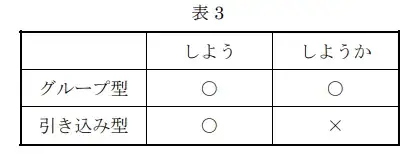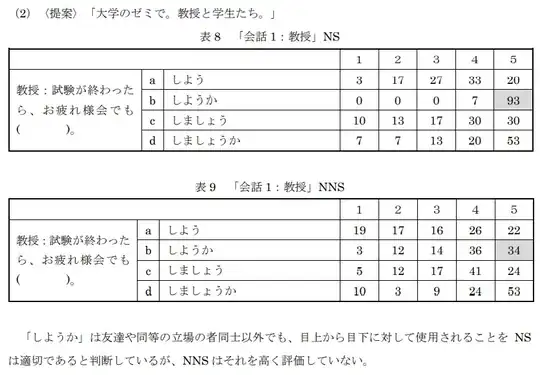I personally consider the different usages of 「~しよう」 「~しようか」 「~しないか」 「~する」 「~してもいいか」 「~してください」 etc. one of the most difficult parts in Japanese grammar, alongside 敬語 and particles (e.g. は/が, で/に). It surprises me that there seemingly haven't been detailed discussions on this on our site. Several things stood out to me as I was reading a paper on the difficulty of these phrases and teaching the nuances of these phrases to Japanese learners——山下(2001), my primary source and the genesis of this question
安達(1995)や日本語記述文法研究会編(2003)では〈勧誘〉を次の表 3 のように、話し手と聞き手が共同で行為の実行をする「グループ型」と、話し手の行為に聞き手を引き込もうとする「引き込み型」に分けている。この中で「しようか」が「引き込み型」には使用できない例を以下に示す。
山下(2001), citing 安達(1995) and 日本語記述文法研究会編(2003), claims that, unlike 「~しよう」, 「~しようか」 can't be used as an invitation for the listener to join something that the speaker is already part of. But as @naruto points out in this answer, 「佐藤さんも入ろうか」 makes sense but sounds peremptory. I wonder how 山下(2001) and 安達(1995) differentiate between 「~しようか」 and 「~しよう」, and why they exclude 「~しようか」 from 引き込み型.
Is it because in this usage 「~しようか」 is stronger than 「~しよう」, crossing over into the domain of commands rather than an invitation? For example, a parent may say to their kid: 学校を休もうか
In 表4 the difference between 意志決定に伴う宣言 and 意志未定の表出 appears clear enough. So the source of confusion still lies with 勧誘(引き込み型).
The following seems to be a totally different usage where the speaker is making a suggestion that the listeners do something.
山下 did a survey with hundreds of native speakers (NS) and non-native speakers (NNS) where the subjects were asked to indicate how suitable some phrases are in certain contexts. In this example from 山下(2001),
試験が終わったら、お疲れ様会でも( )
the vast majority (93%) of native speakers surveyed indicated their preference for しようか, in stark contrast to a much smaller group (20%) who went for しよう. Non-native speakers, on the other hand, were not able to tell that しようか was the most suitable term in this context.
Why is しようか preferred in this sentence?
参考文献
- 山下由美子. "「しよう」「しようか」 の意味・用法: 日本語教育への提案." 創価大学大学院紀要= The bulletin of the Graduate School, Soka University 33 (2011): 299-327.
- ——————(2004)「「しよう」の意味・用法 ―〈非難〉・〈願望表出〉の「しようよ」」『日本語/日本語教育研究(ココ出版)』5, pp. 91-106


